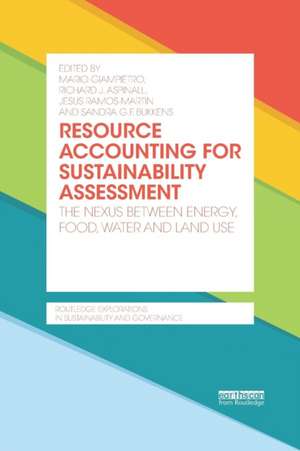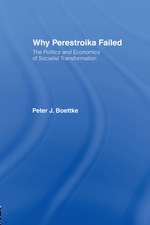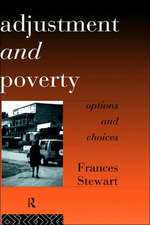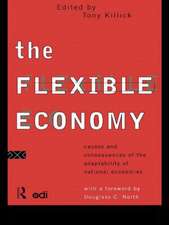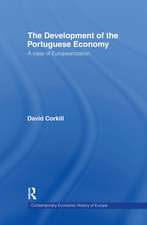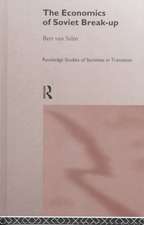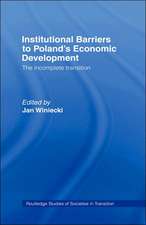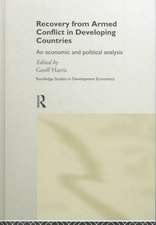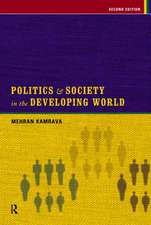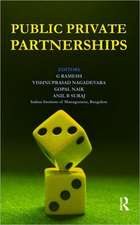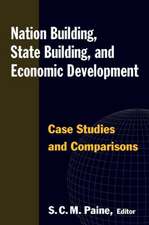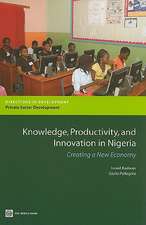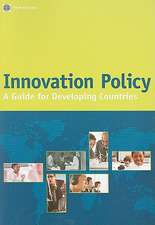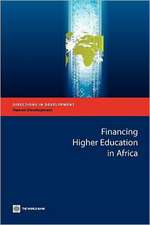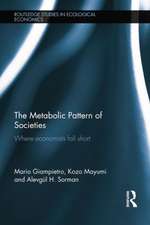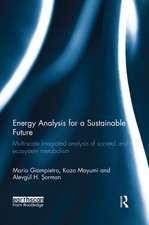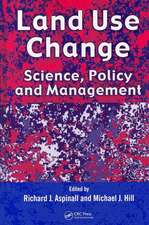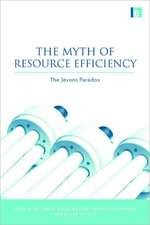Resource Accounting for Sustainability Assessment: The Nexus between Energy, Food, Water and Land Use: Routledge Explorations in Sustainability and Governance
Editat de Mario Giampietro, Richard J. Aspinall, Jesus Ramos-Martin, Sandra G. F. Bukkensen Limba Engleză Paperback – 21 dec 2015
Resource Accounting for Sustainability Assessment: The nexus between energy, food, water and land use offers an approach for multi-scale, integrated assessment of this nexus. It presents a comprehensive and original method of resource accounting for integrated sustainability assessments. The approach is illustrated with three detailed case studies: the islands of Mauritius, the Indian state of Punjab, and the energy economy of South Africa. The relationships between flows of goods, services and materials in these case studies offer valuable insights. The book provides a much needed quality control on the information used in deliberative processes about policy and planning activities.
This innovative book will be of interest to researchers, students and practitioners in the fields of sustainability science, international development, industrial ecology, sustainable resource management, geography and ecological economics.
| Toate formatele și edițiile | Preț | Express |
|---|---|---|
| Paperback (1) | 413.33 lei 6-8 săpt. | |
| Taylor & Francis – 21 dec 2015 | 413.33 lei 6-8 săpt. | |
| Hardback (1) | 1070.28 lei 6-8 săpt. | |
| Taylor & Francis – 28 mai 2014 | 1070.28 lei 6-8 săpt. |
Preț: 413.33 lei
Nou
Puncte Express: 620
Preț estimativ în valută:
79.09€ • 82.58$ • 65.46£
79.09€ • 82.58$ • 65.46£
Carte tipărită la comandă
Livrare economică 04-18 aprilie
Preluare comenzi: 021 569.72.76
Specificații
ISBN-13: 9781138646957
ISBN-10: 1138646954
Pagini: 272
Dimensiuni: 156 x 234 x 14 mm
Greutate: 0.39 kg
Ediția:1
Editura: Taylor & Francis
Colecția Routledge
Seria Routledge Explorations in Sustainability and Governance
Locul publicării:Oxford, United Kingdom
ISBN-10: 1138646954
Pagini: 272
Dimensiuni: 156 x 234 x 14 mm
Greutate: 0.39 kg
Ediția:1
Editura: Taylor & Francis
Colecția Routledge
Seria Routledge Explorations in Sustainability and Governance
Locul publicării:Oxford, United Kingdom
Public țintă
PostgraduateCuprins
Part 1: Theory 1. Addressing the complexity of integrated resource assessment 2. The multi-scale integrated assessment of societal and ecosystem metabolism 3. The scientific basis of the narrative of societal and ecosystem metabolism 4. The interface between societal and ecosystem metabolism 5. Land systems: Multi-scale dynamics of human and environmental systems Part 2: The Toolkit 6. Accounting for human activity and socio-economic characteristics 7. Food grammar 8. Energy grammar 9. Water grammar 10. GIS protocols for use with MUSIASEM 11. The Sudoku effect within MUSIASEM Part 3: Case Studies 12. The Republic of Mauritius 13. Punjab State, India 14. The Republic of South Africa 15. Resource accounting for sustainability assessment
Recenzii
'This is a cohesive book taking on different facets of a unified issue. And what an issue it is; huge, daunting, and something we all knew must be done. But nobody else had the vision and courage to take it on. It is metabolism applied to ecology and society; it is post-normal science in action. Anyone wishing to address metabolism of biology, ecology and society simply must get on top of this work, or just be left behind in the muddle that was heretofore mistaken as acceptable. There are no excuses now.' –Timothy F. H. Allen, University of Madison, USA
'In order to widen horizons and make firm steps towards a new paradigm for resource analysis, a biophysically based approach to prospective studies is fundamental to expose myths constructed under the dominant chrematistic framework. This book is not only oriented to foster debate within academia but especially to guide decision making in public policy truthfully committed and concerned with the future of our civilization. For these reasons I fully recommend the reader to immerse in the contents of this book.' –Andrés Arauz, Vice Minister of Planning and Development for Well Living, Ecuador
'This book shows the need for a non-reductionist approach to biophysical sustainability, and how to accomplish this through a multi-scale characterization. It crosses numerous disciplines and accomplishes a rigorous and comprehensive analysis of sustainability. The result is a tour de force.' –Joseph A. Tainter, Utah State University, USA
'Understanding the relationships between water, land use, energy, and food is a core sustainability challenge. These relationships depend on geography, population, and on economic and social conditions. Extended case studies from South Africa, Mauritius, and Punjab show how decisions must vary among locations and demonstrate an approach for understanding sustainable futures. This book provides students, researchers, and policy makers with a framework and guide for considering sustainable development choices.' –Valerie Thomas, Georgia Institute of Technology, USA
'In order to widen horizons and make firm steps towards a new paradigm for resource analysis, a biophysically based approach to prospective studies is fundamental to expose myths constructed under the dominant chrematistic framework. This book is not only oriented to foster debate within academia but especially to guide decision making in public policy truthfully committed and concerned with the future of our civilization. For these reasons I fully recommend the reader to immerse in the contents of this book.' –Andrés Arauz, Vice Minister of Planning and Development for Well Living, Ecuador
'This book shows the need for a non-reductionist approach to biophysical sustainability, and how to accomplish this through a multi-scale characterization. It crosses numerous disciplines and accomplishes a rigorous and comprehensive analysis of sustainability. The result is a tour de force.' –Joseph A. Tainter, Utah State University, USA
'Understanding the relationships between water, land use, energy, and food is a core sustainability challenge. These relationships depend on geography, population, and on economic and social conditions. Extended case studies from South Africa, Mauritius, and Punjab show how decisions must vary among locations and demonstrate an approach for understanding sustainable futures. This book provides students, researchers, and policy makers with a framework and guide for considering sustainable development choices.' –Valerie Thomas, Georgia Institute of Technology, USA
Descriere
This book offers an approach for multi-scale, integrated assessment of land use, water, energy, food, populations and environmental resources. The approach is based in resource accounting, providing insights through exploring the relationships between flows of goods, services, and materials, and the funds of natural, human, social, financial, physical, and economic capitals, at multiple scales. The text describes the conceptual, technical and applied aspects of the approach, using international case studies to illustrate the manner in which it can be applied and used to improve understanding of the interdependencies of land use, water, energy and food for decision making.
